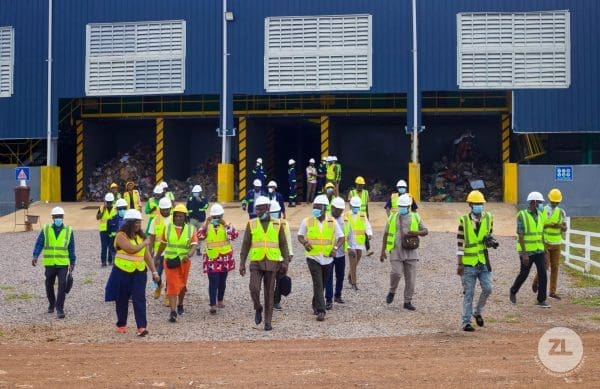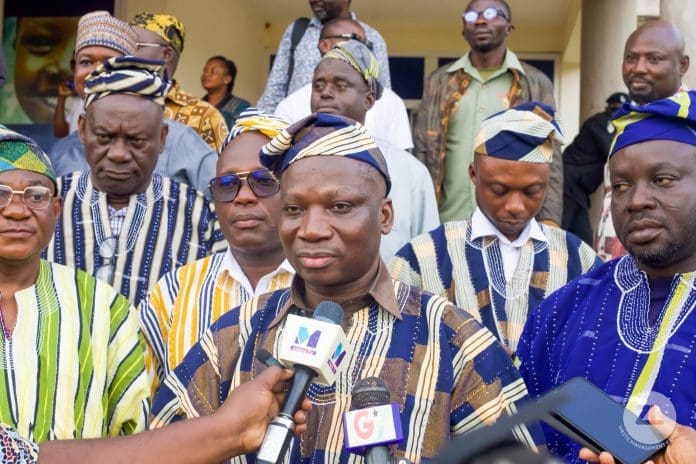The Parliamentary Select Committee on Sanitation and Water Resources has intensified calls for a dedicated funding mechanism to address Ghana’s sanitation crisis, citing over GH₵1.3 billion owed to private sector service providers as evidence of systemic financing failures.
Committee Chairman Hon. John Kwabena Oti Bless emphasized during a Wednesday facility tour in Tamale that Ghana’s ad-hoc approach to sanitation financing has created unsustainable payment delays that threaten service delivery. The visit to Zoomlion’s integrated waste treatment facilities highlighted both the potential of private sector innovation and the risks of unreliable government payments.
The government currently owes approximately GH₵1.3 billion to sanitation service providers, with Zoomlion representing a significant portion of these outstanding debts. These arrears have accumulated despite the 2025 budget allocating GH₢13 billion specifically for clearing government arrears across various sectors.
The timing of the parliamentary committee’s advocacy coincides with expanding regional interest in Ghana’s waste management expertise. During the Tamale tour, Oti Bless revealed that Zoomlion is negotiating to establish similar facilities in Burkina Faso following a recent delegation visit to their Kumasi plant, indicating growing recognition of Ghana’s waste management capabilities despite funding challenges.
The committee’s tour encompassed Zoomlion’s Integrated Recycling and Compost Plant, Wastewater Treatment Plant, and Medical Waste Services Limited, all co-located at Gbalahi. These facilities represent significant private investment in environmental infrastructure, making reliable government payments crucial for operational sustainability and future expansion.
“Waste generation is a daily problem,” Oti Bless stated, emphasizing that sanitation requires predictable, consistent funding rather than discretionary budget allocations. His comments reflect broader recognition that Ghana’s sanitation challenges demand institutional financing mechanisms similar to those used internationally for essential services.
Industry stakeholders have identified timely government payments, equipment maintenance costs, and worker remuneration as key challenges facing Ghana’s waste management sector. These operational pressures are compounded by the acidic nature of waste that accelerates equipment deterioration, requiring sustained investment in replacement and maintenance.
The committee’s advocacy extends beyond immediate debt clearance to structural reform of sanitation financing. International best practices typically involve dedicated revenue streams through taxes, levies, or ring-fenced budget allocations that ensure predictable funding regardless of political priorities or fiscal constraints.
Ghana’s sanitation sector employs thousands through companies like Zoomlion, making payment reliability crucial for employment stability. Earlier this year, the committee opposed calls to terminate Zoomlion’s Youth Employment Authority contract, citing potential job losses and the company’s service contributions.

The parliamentary intervention occurs as Ghana grapples with broader waste management challenges. During COP28 in 2023, Ghana announced groundbreaking waste management initiatives aimed at revolutionizing the sector through sustainable development and climate action, but implementation depends heavily on reliable financing mechanisms.
Oti Bless emphasized that sanitation success requires collaborative efforts between government, private sector, and citizens. He called for attitudinal changes to reduce indiscriminate dumping while advocating for government incentives supporting environmental investments by Ghanaian businesses.
The expansion discussions with Burkina Faso demonstrate how Ghana’s sanitation expertise could generate regional revenue streams, but only if domestic financing challenges are resolved. Successful international partnerships require demonstrated operational reliability and financial stability that current payment delays undermine.
The committee’s renewed pressure on government comes as the 2025 fiscal year progresses with limited evidence of accelerated arrears clearance. While the GH₢13 billion allocation provides hope for debt resolution, systemic reforms preventing future accumulation remain essential for sector sustainability.
Success in establishing dedicated sanitation funding could position Ghana as a regional leader in waste management financing, potentially attracting international development support and private investment. However, failure to address current payment crises may discourage both domestic and foreign investment in Ghana’s environmental infrastructure.
Source: newsghana.com.gh











